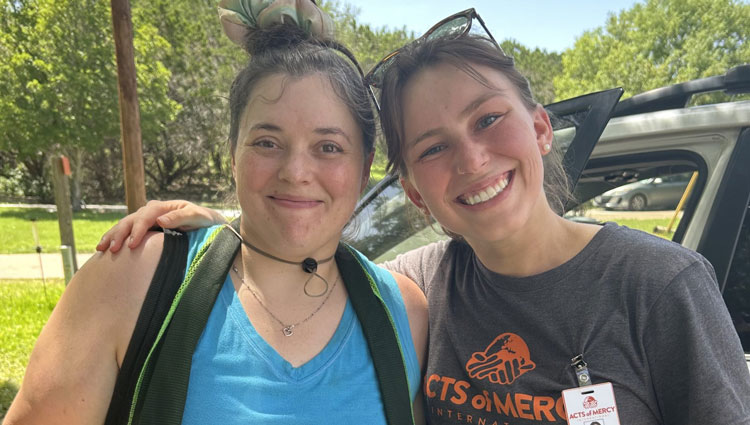When the waters rose in Hunt, Texas this July, life-long resident Kylie Nidever stood at her window and stared at the neighborhood, only to see a landscape she didn’t recognize.
“I couldn’t entirely understand what I was looking at,” she said. “It was a pool. A flat surface, a mirror of water. I couldn’t see the grass.”
The morning after the bulk of rainfall, the flood had retreated, leaving behind its strange markers—dead fish scattered, mud lines painted high on walls, cars sitting sideways. Homes received anywhere from a few inches to eight-feet of water. Out of 33 houses in her middle-class neighborhood of Bumble Bee Hills, 28 homes took on water. Hers was one of the spared.
At that point, Nidever didn’t know the full extent of the flooding. However, as the morning progressed, news started to come in.
“In the immediate aftermath, there was guilt,” she said. “Survivor’s guilt, because our house didn’t flood.”
What replaced guilt was a desire to help.
The Sound of Absence
Help arrived almost immediately—but not from the government, the people paid to provide it. Strangers pulled into her street with pickup trucks, handing out gift cards for H-E-B. Neighbors helped neighbors. Volunteers dropped off cleaning supplies and bottled water. A nonprofit, Mercy Chefs, began serving hot meals twice a day.
“We’re filthy with supplies,” Nidever said. “The community showed up.”
The government did not.
Her community in Hunt, Texas is unincorporated. There is no mayor, no city office, no clear public figure to turn to. Responsibility for disasters falls to Kerr County. But Nidever has yet to see a single county employee in her middle-class neighborhood.
“Kerr County does not possess the infrastructure to handle the magnitude of this situation,” she said. “We didn’t possess it at the time of the flood, and now in recovery, we’re just left high and dry.”
It was not just a logistical failure but a civic one, Nidever insisted.
Speaking Out
Nidever eventually traveled to testify at a state hearing. She watched her county officials sit beneath the fluorescent lights, fumbling through answers.
“They looked so pathetic up there,” she said. “Our county looked so foolish.”
Nidever spoke about Bumble Bee Hills and her experience of community tragedy.
“Many homes were ruined,” Nidever said in her testimony, “and we are now faced with the monumental task of rebuilding and resuming our everyday lives while bearing these new unseen scars of trauma.”
The failures weren’t abstract. Nearby counties had passed ordinances banning temporary cabins and campsites along vulnerable riverbanks—measures that might have prevented deaths. Kerr County had no such protections.
“Those laws could have saved lives,” Nidever said.
Her frustration stretched to Austin. “Governor Abbott does not care about flood victims or the recovery,” she said. “Nor does he seem to grasp the magnitude of the situation.”
Counting What Doesn’t Count
What gnaws at Nidever most is the way suffering gets measured. The official tallies focus on property loss and permanent residents, but some of those caught in the flood were visitors—families renting Airbnbs along the Guadalupe River.
“That’s nine people carrying trauma back with them, even out of state,” she said. “Trauma has ripple effects. Those people deserve help. They deserve free counseling like the rest of us.”
Nidever acknowledged that scars from the flood go far beyond the numbers. As her community rebuilds, those affected grapple with what it means to be reminded of disaster daily and still forced to return to “normal.”
The Myth of Preparedness and Governmental Support
Two months on, Hunt’s recovery still runs on volunteers. In Bumble Bee Hills, Nidever shared that the community feels the warmth and support of their neighbors. The only thing absent is a visible government.
Nidever has a blunt theory why: “They thought they were getting a cushy retirement gig,” she said of county leaders.
Following Nidever’s account, her story is not about a freak storm or a once-in-a-century flood. It’s about what happens when the government’s capabilities are not enough. Since the floods, Nidever has not only been an advocate for her community on Facebook and other digital channels, but she’s been helping her neighbors–picking up her community, piece by piece.
“My mom and I wound up checking on an older couple that we’re friends with in the neighborhood,” Nidever said, “and the wife had actually cut her feet trying to get out of their home. They didn’t have anyone coming, so my mom and I showed up, and all the volunteers.”
Nidever attested to the work of the community in rebuilding her neighborhood, thanking volunteers who did everything in their power to ensure Bumble Bee Hills was equipped for recovery. As for government officials and government help? Nidever, speaking on behalf of her neighborhood, feels neglected.
““They were not prepared, and they were not vigilant,” Nidever said. “We’re left high and dry.”


